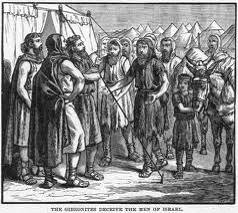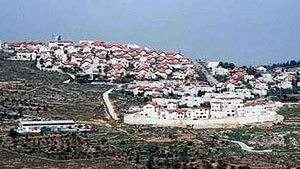Joshua 9 (Gibeonites)
And welcome back to this week's final installment of the Internet's greatest Bible commentary, in which Yours Truly reads through the Bible and explains its many mysteries as best his limited education allows. He encourages you to read the Good Book with him, because his time's too valuable to write summaries. Here we go!
9:6 And [the Gibeonites] went to Joshua to the camp at Gilgal, and said to him and to the men of Israel: "We have come from a distant land, and now make a covenant with us."
Notice that the Israelites consider a promise made to someone to be binding, even if that person lied to obtain it. Oaths, blessings, and curses were powerful and irrevocable things in antiquity. Their importance is why one of the Ten Commandments is to "not take the LORD's name in vain", as the King James Version famously puts it. The commandment is warning you that it's a sin to say something like "I swear by God in Heaven that I will repay you next Tuesday" and then break your word.
"Wait! Wait! Back up! Who were the Gibeonites?" you ask. Well, they were, quite simply, the people who lived in the city of Gibeon, much as New Yorkers are people who live in New York. Ethnically-speaking, they were apparently Hivites.
"And who are the Hivites?" you implacably inquire.
I hate it when you ask questions I can't answer. But at least in this case nobody can. Out of the seven different nations living in Canaan at the time of Joshua's invasion, the Hivites are the most obscure. The only detail known about them is that they were uncircumcised, which seems to me like a highly personal thing to know about folks who are otherwise completely mysterious to you.
At least why they're mentioned in the Book of Joshua is easier to figure out. Whoever the Gibeonites were and whatever happened to them, they clearly still lived in Canaan at the time the Book of Joshua was written. The writers of the Book of Joshua needed to explain their presence.
Remember the writers' goal and you'll understand the problem: the story of Joshua was written to help unite all the people of Israel and Judah against their conquerors, the Assyrians. First, it tells the inspiring story of an Israelite general taking over the Promised Land. Joshua and his army are meant to serve as an example for everyone to follow. Second, the Book of Joshua shows Joshua dividing the Promised Land among the twelve tribes of Israel. It reminded the Jews, as it still does today, that they were one people, not many, and that the whole land belonged to them, so they had a right and even a God-given duty to kick out foreigners.
But if that was true, who were these Gibeonite people? Everyone knew this un-assimilated minority had been living in Canaan for practically forever. They weren't children of Abraham, that was for sure; just look at their yoohoos.
Chapter 9 of the Book of Joshua answers this question with a story so convenient and racist that it's practically impossible to accept at face-value: they were so scared of us when we arrived that they tricked us into letting them live, then promised to be our gofers. Especially considering the importance that the ancient Israelites placed on one's heritage, the writers' message is equally transparent: the Gibeonites of today are also cowards and should still be our gofers.
Still, if I were a Gibeonite I would count myself lucky. After all, the writers of Genesis explained Moab and Ammon to be what happens when girls sleep with their fathers.
By the way, there is a modern city of Gibeon - "New Gibeon" now - but it's full of Jews, not Hivites. It's small because it was only resettled in 1977 and because you have to be brave/crazy to live there; it lies in the Arab territory now known as the West Bank / Judea and Samaria Area. Here's a picture:
Have a good weekend!
NEXT TIME: Chapter 10! Duh!
Bible Translation: Judaica Press's Tanach with Rashi commentary, courtesy of Chabad.org.
OTHER POSTS IN THIS SERIES: Joshua 7-8 Joshua 5-6 Joshua 2-4 Joshua 1
This entry was not tagged.

